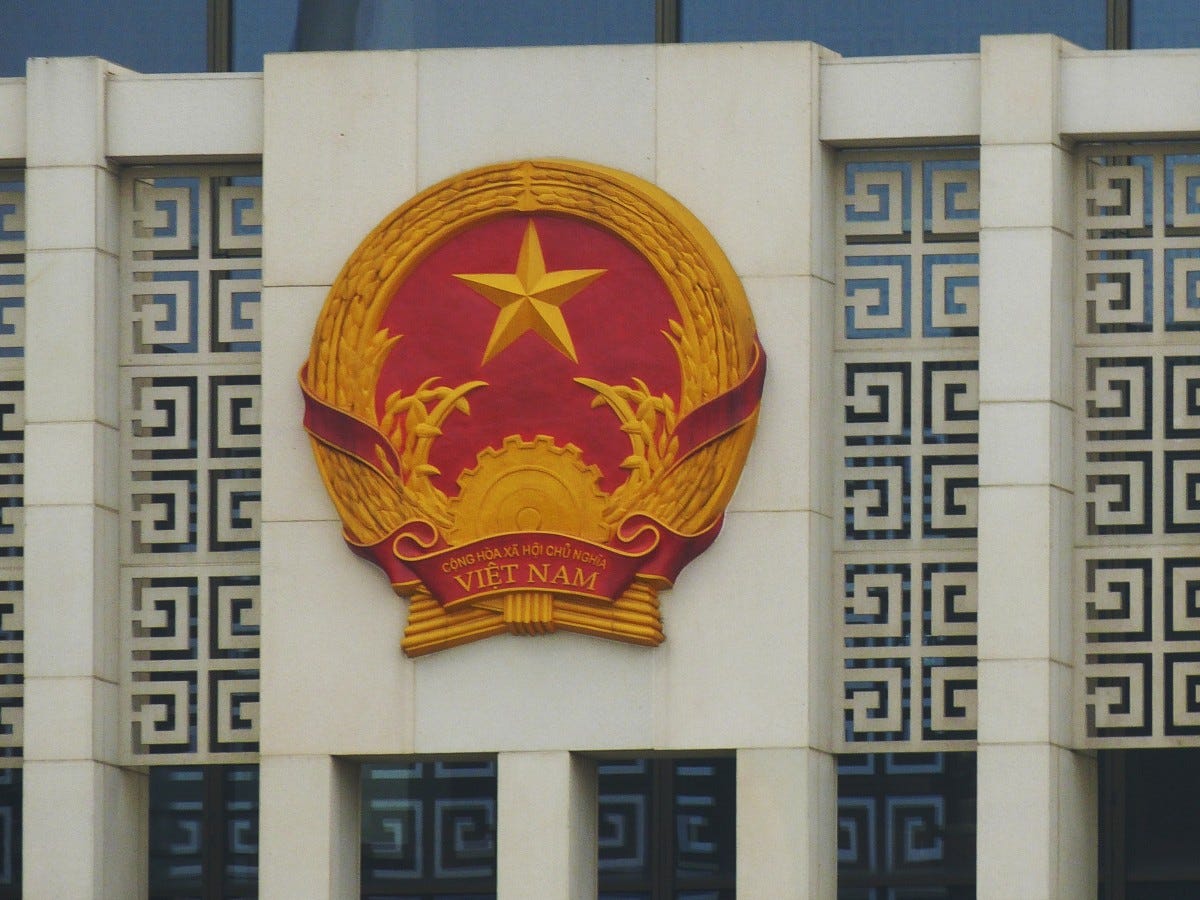Apr. 16, 2024 ❧ NYT's "Don't Say Palestine" policy, Iran retaliates against Israel, and DeSantis protects violent cops
Plus: National Poetry Month, Sioux leaders send Kristi Noem off the reservation, the UK's healthcare profiteers, and an adorable rodent
The news will continue until morale improves.
STORIES THAT SHOULD BE BIGGER
THE NEW YORK TIMES’ “DON’T SAY PALESTINE” POLICY
New reporting from Ryan Grim and Jeremy Scahill at The Intercept has revealed that The New York Times has systematically restricted writers from honestly covering basic facts about the war in Gaza and the broader Israel-Palestine conflict, and required them to use language that downplays attacks on Palestinians and defers to Israel’s framing of the conflict. An internal memo on journalistic objectivity, written by standards editor Susan Wessling, international editor Philip Pan and their deputies, reportedly:
Instructed journalists covering Israel’s war on the Gaza Strip to restrict the use of the terms “genocide” and “ethnic cleansing” and to “avoid” using the phrase “occupied territory” when describing Palestinian land.
The memo also instructs reporters not to use the word Palestine “except in very rare cases” and to steer clear of the term “refugee camps” to describe areas of Gaza historically settled by displaced Palestinians expelled from other parts of Palestine during previous Israeli–Arab wars.
The Times also told reporters to refrain from using the “incendiary” phrase “genocide” when describing Israel’s killing of tens of thousands of Palestinian civilians, including 15,000 children, including in quotes unless the speaker provides a legal argument for it.
But the paper has not employed a similar restraint for Hamas’ attacks against Israelis. Another memo encouraged reporters to refer to Hamas’ October 7 attacks against Israeli civilians as “terrorism” and to avoid using more neutral language like “militant.” It does not, however, use the phrase “terrorism” to describe Israel’s attacks on hospitals, aid trucks, and civilian infrastructure.

A previous Intercept analysis from November 2023 found that major American newspapers, including the New York Times, Washington Post, and Los Angeles Times used vastly more sympathetic language to describe the killing of Israeli civilians than Palestinians, even though more than 22,000 Palestinians had died by this point compared with just over 1,100 Israelis within the same period.
Highly emotive terms for the killing of civilians like “slaughter,” “massacre,” and “horrific” were reserved almost exclusively for Israelis who were killed by Palestinians, rather than the other way around. (When the terms appeared in quotes rather than the editorial voice of the publication, they were omitted from the analysis.)
The term “slaughter” was used by editors and reporters to describe the killing of Israelis versus Palestinians 60 to 1, and “massacre” was used to describe the killing of Israelis versus Palestinians 125 to 2. “Horrific” was used to describe the killing of Israelis versus Palestinians 36 to 4.
The New York Times was among the worst offenders, describing the killings of Israelis as a massacre on 53 occasions while using the term just once to describe the killings of Palestinians. As The Intercept wrote back in November:
One typical headline from the New York Times, in a mid-November story about the October 7 attack, reads, “They Ran Into a Bomb Shelter for Safety. Instead, They Were Slaughtered.” Compare this with the Times’s most sympathetic profile of Palestinian deaths in Gaza from November 18: “The War Turns Gaza Into a ‘Graveyard’ for Children.” Here “graveyard” is a quote from the United Nations and the killing itself is in passive voice. In its own editorial voice, the Times story on deaths in Gaza uses no emotive terms comparable to the ones in its story about the October 7 attack.
This policy demonstrates an obvious double standard that treats Israeli life as inherently more valuable than Palestinian life. And while the precise application of such loaded terms as “genocide” is a fair thing to debate (even though, as we have argued, the genocidal intent of Israel’s government is quite clear), the choice clearly had little to do with avoiding journalistic bias and everything to do with minimizing the severity of Israel’s actions.
Obvious bias from journalists who claim “objectivity” is bad enough, but The Times’s mandates to “avoid” phrases like “occupied territory,” “refugee camps,” and even “Palestine” represent not just bias, but the decision to actively mislead readers about basic facts of the Israel-Palestine conflict. The Intercept report continues:
In the cases of describing “occupied territory” and the status of refugees in Gaza, the Times style guidelines run counter to norms established by the United Nations and international humanitarian law.
On the term “Palestine” — a widely used name for both the territory and the U.N.-recognized state — the Times memo contains blunt instructions: “Do not use in datelines, routine text or headlines, except in very rare cases such as when the United Nations General Assembly elevated Palestine to a nonmember observer state, or references to historic Palestine.” The Times guidance resembles that of the Associated Press Stylebook.
The memo directs journalists not to use the phrase “refugee camps” to describe long-standing refugee settlements in Gaza. “While termed refugee camps, the refugee centers in Gaza are developed and densely populated neighborhoods dating to the 1948 war. Refer to them as neighborhoods, or areas, and if further context is necessary, explain how they have historically been called refugee camps.”
The United Nations recognizes eight refugee camps in the Gaza Strip. As of last year, before the war started, the areas were home to more than 600,000 registered refugees. Many are descendants of those who fled to Gaza after being forcibly expelled from their homes in the 1948 Arab–Israeli War, which marked the founding of the Jewish state and mass dispossession of hundreds of thousands of Palestinians.
Times spokesperson Charlie Stadtlander describes the paper’s goal with these directives as “ensur[ing] accuracy, consistency, and nuance.” But it has done just the opposite, When Israelis are victims, it has had no issue using loaded language and publishing unconfirmed reports of Palestinian atrocities that they have later had to walk back. But when it comes to the mass killing of Palestinians, which has happened at a much greater volume, The Times has made every effort not just to minimize the descriptions, but to deny any surrounding context that makes Israel look bad.
We should think of this the same way we think about Ron DeSantis’ “Don’t Say Gay” and “Don’t Say Climate Change” laws in Florida, which attempt to systematically prevent ideologically inconvenient language from places of authority.
What The New York Times is doing is arguably even worse. We should expect politicians to attempt to wield language in a way that is politically advantageous. But The New York Times considers itself America’s “paper of record” and obsesses over its putative “objectivity.” Their systematic denial of basic reality about the Israel-Palestine conflict is an eternal black mark that should forever taint their reputation as a premier news source.
BIG STORY
IRAN RETALIATES - IS A BIGGER WAR AHEAD?
Last week, we told you about the Israeli government’s horrifyingly reckless attack on the Iranian consulate in Damascus, and the risk of escalation into full-blown war once Iran responded. Well, that response has come. On Saturday, Iran launched what the Associated Press calls an “unprecedented revenge mission,” sending “hundreds of drones, ballistic missiles and cruise missiles” to strike targets within Israel. It’s the first time a state military has attacked Israel since Iraq in 1991, and a dangerous development for the entire Middle East.

There are a few important takeaways here. First, the actual damage caused by the Iranian attack appears to be fairly limited. In a public statement on the 14th, President Biden said that “nearly all” of Iran’s drones and missiles had been shot down, and Israel itself concurs, saying that around 99 percent were intercepted. For The Intercept, Murtaza Hussain argues that Iran’s attack “appeared calculated not to escalate the situation,” and that seems accurate enough. All things considered, it’s probably much less than the United States would do if someone blew up our embassy.
Unfortunately, that doesn’t mean the risk of war is diminished. Just the opposite. In order to curtail the threat, the international community—and especially the United States—would need to impose consequences on Israel for destroying the Damascus embassy in the first place. Instead, President Biden said he would “reaffirm America’s ironclad commitment” to support Israel. This can only encourage Benjamin Netanyahu and his government to commit further provocations, since they suffered no serious penalty for the first. Already, figures in the Israeli military are promising to “exact a price” on Iran. And as Hussain points out, Netanyahu has a strong motive to provoke a regional war, which could “delay his day of reckoning” over the crisis in Gaza “or even change his personal fortunes entirely.”
To make matters worse, the entire Middle East is full of U.S. military hardware and personnel. In another analysis for The Intercept, Ken Klippenstein and Daniel Boguslaw detail just how much American weaponry has already been deployed, and in how many places:
[U.S.] Army long-range Patriot and Terminal High Altitude Area Defense surface-to-air missile batteries have been deployed in Iraq, Kuwait, the United Arab Emirates, Qatar, Saudi Arabia, Jordan, and at the secretive Site 512 base in Israel. These assets — plus American aircraft based in Kuwait, Jordan, the UAE, Qatar, and Saudi Arabia — are knitted together in order to communicate and cooperate with each other to provide a dome over Israel (and its own regional bases). The United Kingdom is also intimately tied into the regional war network, while additional countries such as Bahrain have purchased Patriot missiles to be part of the network.
This is worrying, to say the least. All it would take is a few members of the U.S. military being struck and killed by a stray rocket, and the situation might go downhill extremely fast. Add to that the fact that both Iran and Israel are nuclear powers, and things get even dicier. A regional war in the Middle East would threaten millions of people’s lives, and a nuclear one could endanger the entire planet. It has to be avoided at all costs, and bringing Israel’s increasingly unstable government to heel is Step One.
AROUND THE STATES
❧ Florida Governor Ron DeSantis—yes, him again—has banned civilian review boards from investigating cops. On April 12, DeSantis signed a new law called HB 601, which excludes civilian panels from “investigation of complaints against law enforcement officers or correctional officers.” As Tampa Bay’s Fox 13 notes, there are currently at least 21 such review boards in Florida, including one in Tampa Bay itself. But under the new law, these are considered “political subdivisions,” and banned from doing their jobs. Instead, only panels set up by county sheriffs—who would appoint all the members—will be authorized to investigate accusations of police misconduct. It should be noted that civilian review boards don’t guarantee justice; in some cases, like in Los Angeles, they’ve delivered results that are actually more lenient toward police. But stripping their authority entirely and allowing police to investigate themselves without civilian oversight is kind of like having students in school grade their own homework. No doubt the vast majority of cases will conclude with the police concluding that they did nothing wrong. Police brutality is already a serious issue in Florida; last October, cops in Jacksonville were filmed slamming a handcuffed Black man’s head into the ground during a traffic stop, and that’s just one such case. DeSantis’s latest law will only encourage more police violence and protect the perpetrators. But clearly, the Governor is okay with that.

HAPPY NATIONAL POETRY MONTH!
This April, there are all kinds of ways to explore and celebrate the world of poetry, but one particularly cool one stands out. In Oregon, Anis Mojgani—the state’s Poet Laureate—has set up a good old-fashioned telephone hotline. The concept is simple: you dial the number, and Mojagani or one of his associates reads you that day’s recorded poem. Usually it takes around four minutes, and although it’s a bit echoey, it’s a delightful little piece of retro fun. (Imagine if our governments committed more resources to the office of the Poet Laureate, and less to endless policing and war!) By pressing a few buttons, you can also hear archived poems from previous days.
You can try the Oregon Telepome Hotline today at 503-928-7008, or read more about it here.

Meanwhile, here’s a poem we like from Current Affairs contributor W.D. Ehrhart:

❧ Native American leaders in South Dakota have banned Governor Kristi Noem from their tribal territory. The drastic move comes after Noem—who’s been mentioned as a possible running mate for Donald Trump—made a series of inflammatory comments about Native Americans. During a town hall meeting in March, Noem accused Native leaders of colluding with Mexican drug smugglers, saying that “We’ve got some tribal leaders that I believe are personally benefiting from the cartels being here.” She also invoked racist stereotypes about Native families, saying that “Their kids don’t have any hope. They don’t have parents who show up and help them.” Speaking to the Sioux Falls CBS affiliate KELO, Crow Creek Sioux chairman Peter Lengkeek said there’s no actual evidence for Noem’s allegations about cartels—but that the narrative is being used as an excuse for police harassment against members of his tribe:
“We’ve had a lot of people pulled over off-reservation and just held up, their cars destroyed by doing drug checks because they think we’re carrying cartel drugs,” he said. “It’s really upsetting and what (Noem) did was create an environment that is conducive to racial profiling and hate crimes. … She made life really difficult on Indigenous people here in South Dakota.”
In the past, Noem has also been a loud supporter of the Keystone XL pipeline, which the Sioux refer to as “the Black Snake” for the environmental threat it poses to their land and water, and has moved to remove Indigenous history from South Dakota schools. As a consequence of all this, tribal leaders in the state have finally had enough, and have shown her the door. Back in February, the Oglala Sioux tribe officially banished Noem from setting foot in the Pine Ridge reservation, one of the largest in the United States.
More recently, the Cheyenne River Sioux, Standing Rock Sioux, and Rosebud Sioux have followed suit, banning the Governor from their respective homelands. Thanks to her anti-Native prejudice, Noem is now unwelcome in roughly 14 percent of South Dakota, and would be subject to arrest by tribal authorities if she attempts to enter. Given the U.S. government’s long, shameful history of mistreating Native Americans, it’s not surprising the various Sioux tribes felt this step was necessary. If anything, it's impressive that they showed Noem and her bigotry this much patience.

AROUND THE WORLD
❧ In the UK, Labour MP Wes Streeting has been taking big donations from healthcare privatizers. For Scotland’s The National, journalist Xander Elliards breaks down exactly who’s been lining Streeting’s pockets, and the answers are alarming. According to Elliards, Streeting—who serves as the Labour Party’s “Shadow Secretary” for health and other social services—has accepted approximately £175,000 from individuals with a financial interest in privatizing British healthcare.
That figure includes £65,000 from John Armitage, a hedge fund manager with a large stake in the multinational firm UnitedHealth, and separate donations of £12,000 and £35,475 from firms controlled by Peter Hearn, an executive who recruits doctors and other professionals from the National Health Service (NHS) to the private sector. These large sums of cash may explain some of Streeting’s recent rhetoric about the NHS, like when he said the service “isn’t fit for the modern era,” that the “miracle of the market” is needed to reform it, or that “bringing in the private sector to help cut waiting times” is the appropriate solution.
Without a direct admission, it’s not possible to prove people like Hearn and Armitage are buying influence with Streeting, but it’s not exactly implausible either. The MP’s pro-market comments are just the latest assault on the NHS, which has faced decades of austerity policies from successive governments. It’s another betrayal of the British people from a Labour party that’s been moving further and further right since Keir Starmer took over in 2020. Writing from the United States, we can say with some confidence to our British readers: you do not want a privatized healthcare system. Kick Starmer, Streeting, and their paymasters out of office before they demolish the NHS and hold your health to ransom.

❧ Vietnam just sentenced a billionaire to death. A court in Ho Chi Minh City handed down the punishment to real estate mogul Truong My Lan last Thursday, finding her guilty of $12.5 billion in fraud. As the Associated Press reports, Lan had taken control of the Saigon Joint Stock Commercial Bank (SCB) through a merger in 2011, made thousands of loans to nonexistent “ghost” companies, and bribed investigators to hide the entire scam. Her harsh sentence comes as part of Vietnam’s ongoing “Blazing Furnace” campaign, which is aimed at rooting out corruption throughout the country.
In a lot of ways, East Asian countries have a much healthier relationship to their billionaires than those in Europe and the Americas. Over in the Western Hemisphere, people like the Sacklers and Jeff Bezos are allowed to cause a lethal opioid crisis or work their employees to death in unsafe warehouses, and there’s rarely any real consequence (beyond a fine, which is meaningless to people with such deep pockets.) Even Donald Trump has gotten away with a long catalog of misdeeds. Meanwhile, if a billionaire in Vietnam or China steps out of line, they’re quickly put in their place by the state, like when Chinese retail tycoon Jack Ma disappeared for three months in 2021. It’s a much more civilized system.
Still, with all respect to the Communist Party of Vietnam, they may have gone a trifle overboard here. The death penalty is a pretty indefensible thing no matter who it's used against, and the historical experience of eras like the Stalinist one gives us good reason to be wary of political parties that are too enthusiastic about using it. Merely confiscating billionaires’ assets and putting them to work doing something useful, like planting trees or cleaning up litter, would do just fine.

CROOKS vs. SICKOS (or, What’s going on with our politicians?)
❧ Senator Tom Cotton has been encouraging his followers to commit violence against pro-Palestinian protesters. In the past 24 hours, there have been a series of dramatic demonstrations for Gaza in major U.S. cities. In Chicago, protestors blocked Interstate I-90 leading into O’Hare Airport for a little more than an hour. In Seattle they similarly blocked State Route 518 leading into the Seattle-Tacoma International Airport, delaying 139 flights. In San Francisco they shut down the Golden Gate Bridge, bearing signs that read “Stop the World for Gaza.” In San Antonio they blocked two different roads leading to Valero Energy’s corporate headquarters, and in Philadelphia demonstrators led a “funeral procession” of cars through I-95 for the dead of Palestine. It’s all part of a national initiative called A15, which aimed to “shift from symbolic actions to those that cause pain to the economy,” choking off “economic logistical hubs and the flow of capital.” It’s an inspiring movement, and one that may well have a noticeable effect on U.S. policy in the weeks to come.

One U.S. Senator, though, is turning fluorescent with rage about A15. In a tweet posted around 8PM on Monday, Cotton told his 545,000 online followers that people should “take matters into your own hands to get them out of the way” if they see a protest, adding “it’s time to put an end to this nonsense.” Given that he’s talking about a protest on a highway, he’s strongly suggesting that drivers should run protesters over, something right-wing figures have been fantasizing about for several years now. On Fox News, he was even more explicit, saying that “If they glued their hands to a car or the pavement, well, [it’s] probably pretty painful to have their skin ripped off. But I think that is the way we would handle it in Arkansas.”
Both of Cotton’s comments are clear incitements to violence, and should lead to a formal censure in the Senate. (Recall that Representative Rashida Tlaib was censured by the House in November, merely for using the phrase “from the river to the sea.” Can you imagine the outrage if she’d told protestors to “take matters into your own hands?”) Years from now, all of us will be judged by how we responded to the massacre in Gaza. The protestors who are risking arrest and injury to stop it will have a place of honor in the history books, while people like Cotton will be considered embarrassing footnotes, if they’re remembered at all.

TRUMP: ROBERT E. LEE “NO LONGER IN FAVOR” (WOW!)
“Gettysburg. Wow. I go to Gettysburg, Pennsylvania, to look and to watch. And the statement of Robert E. Lee ― who’s no longer in favor, did you ever notice that? No longer in favor ― ‘Never fight uphill, me boys, never fight uphill.’ They were fighting uphill. He said ‘Wow, that was a big mistake.’”
(Note: Historians do not record Robert E. Lee saying “Wow” at the Battle of Gettysburg, and have called Mr. Trump’s remarks “unhinged.”)
❧ The Teamsters have donated $5,000 to Senator Josh Hawley. This news comes as an exclusive from Axios reporter Hans Nichols, who says the union is “jumping into the Missouri Senate race” between Hawley and his Democratic opponent Lucas Kunce. For a while, Hawley has been positioning himself as an allegedly pro-labor Republican, visiting a UAW picket line back in September and a Teamsters one this March. Likewise, the Teamsters have been exploring a relationship with the Republican Party, giving $45,000 to the RNC in February (along with a matching donation to the DNC). Union president Sean O’Brien even had a private meeting with Donald Trump in January, leading Trump to claim he has a “good shot” at winning the union’s endorsement.
From a purely strategic point of view, establishing ties with the GOP could make sense. There’s at least a 50/50 chance that Trump will be President again next year, putting his party in the driver’s seat on labor policy. But O’Brien and the Teamsters are running serious risks here too. Although his rhetoric might be union-friendly, Josh Hawley has voted against minimum-wage increases, for so-called “right to work” legislation, and voiced opposition to the PRO Act during his time in Congress. Trump is even worse, pushing extensive federal deregulation of labor conditions and handing out tax breaks to bosses during his time in office. When you cozy up to vipers like those, there’s a good chance of getting bit.

RODENT FACT OF THE WEEK
The Allegheny Woodrat lives!
The Woodrat—scientific name Neotoma magister—is a member of the pack rat family, found exclusively in the Appalachian Mountains. The second-largest rat in North America, Allegheny Woodrats have unfortunately become pretty scarce. They’re listed as “threatened and protected” in Pennsylvania, where wildlife researchers have been hauling big sacks of chestnuts into the woods in an effort to keep them alive, and as “endangered” in Ohio, where they haven’t been seen for years.
Because they’re reclusive forest-dwelling creatures, it’s hard to tell how many there are exactly, but scientists say the population could be as low as 100,000 in the wild. But friends of the Woodrat got an encouraging sign last month, when a trail cam in West Virginia’s Monongahela State Park caught one scurrying around the forest floor. It’s only the second time an Allegheny Woodrat has been seen in the state since they reappeared in 2022 after 20 years without a sighting. With any luck, this means the situation isn’t quite as bad as experts once though, and this charming little species may be making a comeback.

Writing and research by Stephen Prager and Alex Skopic. Editing and additional material by Nathan J. Robinson and Lily Sánchez. Header graphic by Cali Traina Blume. Fact-checking by Justin Ward. This news briefing is a product of Current Affairs Magazine. Subscribe to our gorgeous and informative print edition here, and our delightful podcast here.
Current Affairs is an independent left media organization supported entirely by its readers and listeners. We offer a beautiful bimonthly print and digital magazine, a weekly podcast, and a regular news briefing service. We are registered with the Internal Revenue Service as a 501(c)(3) nonprofit organization with EIN 83-1675720. Your gift is tax-deductible to the extent allowed by law. Donations may be made through our website, via wire transfer, or by sending us a check. Email help@currentaffairs.org with any questions.






